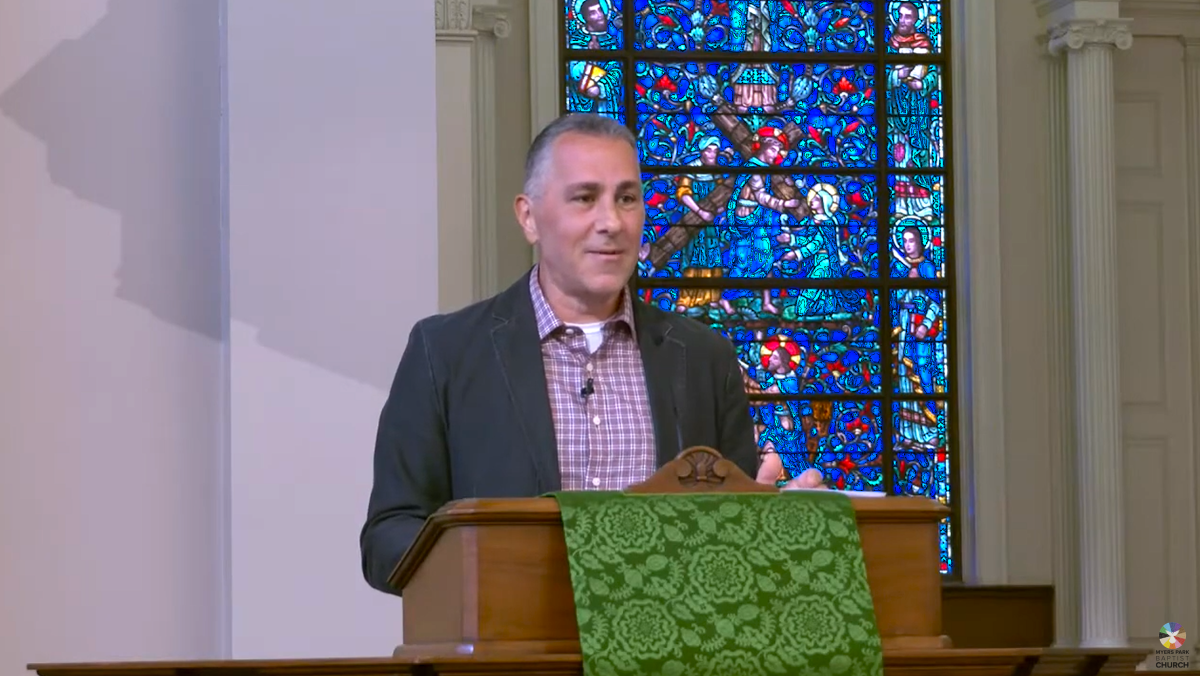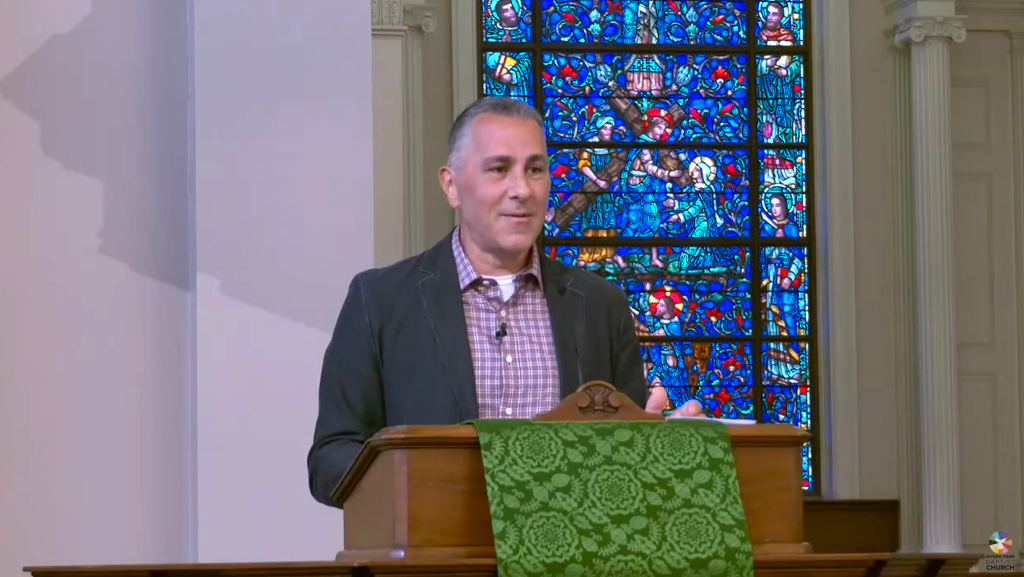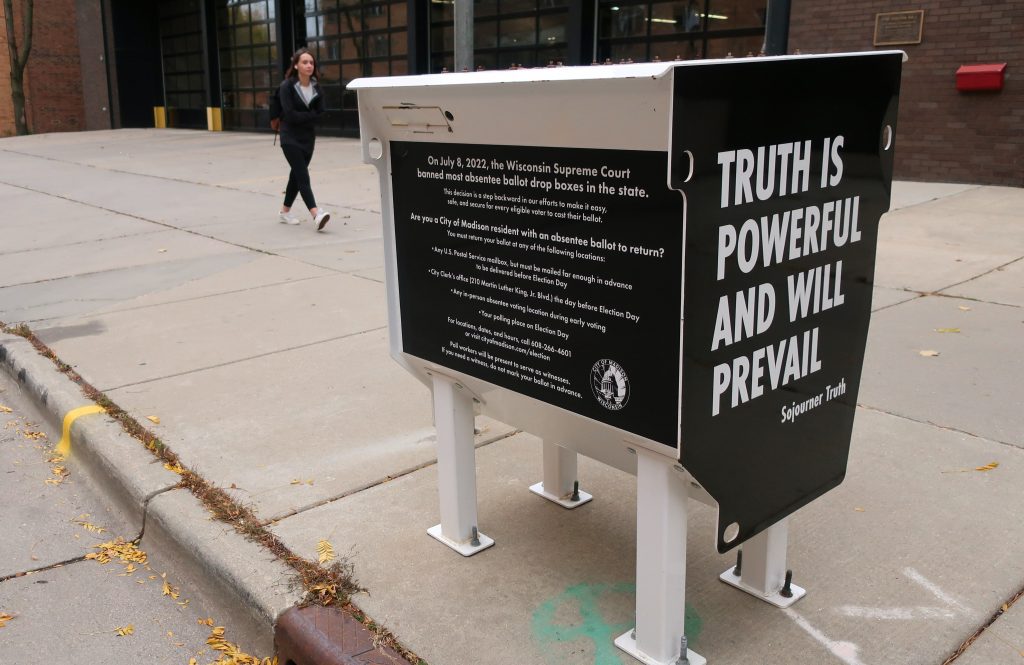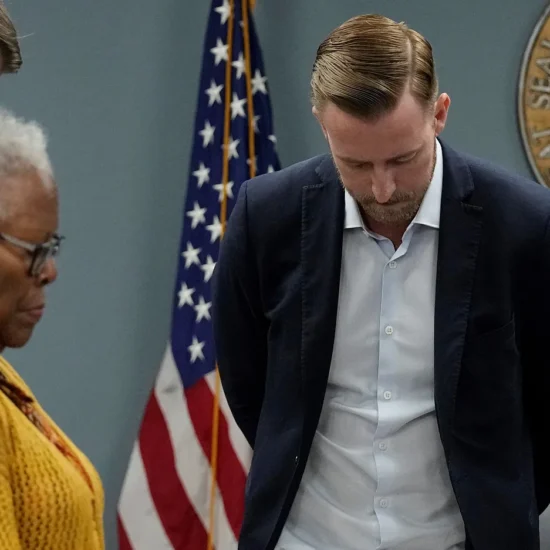
NOTE: This piece was originally published at our Substack newsletter A Public Witness.
The show Happy Days helped define an era of American pop culture. Yet, part of its legacy is rooted not in the success it enjoyed but in debates over its decline. In season five, Fonzie accepts a dare to leap over a tiger shark on water skis. That moment gave birth to the phrase “jumped the shark,” indicating when something previously respected has become ridiculous.
When Joe Biden defeated Donald Trump in the 2020 presidential election, a number of conspiracy theories began to circulate claiming the contest had been rigged. These outlandish ideas were promoted by a range of rightwing figures and outlets once perceived as credible.
Former New York City Mayor Rudy Giuliani and other Trump supporters, including U.S. Rep Mike Johnson, asserted there was a scheme by nefarious actors to manipulate voting machine tabulations in Biden’s favor. One absurd idea they pushed was that the election software company Dominion was created in Venezuela by the late dictator Hugo Chávez (when it’s actually a Canadian company with no ties to Chávez). The air time that Fox News gave to such wild and unsubstantiated charges led to lawsuits and a settlement that cost the network nearly $800 million.

Rudy Giuliani, a lawyer for President Donald Trump, speaks during a news conference at the Republican National Committee headquarters in Washington, D.C., on Nov. 19, 2020. (Jacquelyn Martin/Associated Press)
The film 2000 Mules alleged that illegal ballot-harvesting operations shifted the vote in key states. Trump praised it as “the greatest & most impactful documentary of our time.” Facing legal actions over its false claims and faulty methodology, the film’s publisher ended distribution and its creator, Christian intellectual-turned-rightwing propagandist Dinesh D’Souza, apologized.
Republican elected officials and lawyers, conservative Christian leaders, and rightwing media figures all advanced the “Big Lie” that Trump had actually triumphed at the ballot box. Unable to reckon with rejection, many in the conservative movement jumped the shark. Those efforts led to an insurrection at the U.S. Capitol and immeasurable damage to American democracy.
Now, the same pattern threatens to repeat itself, but this time the purveyors of deception are found on the opposite end of the political spectrum. Ironically, Trump is the victim fantastically portrayed as an illegitimate winner. Instead of Chávez, the alleged mastermind behind the election hack is Elon Musk. And even some Christian influencers are spreading misinformation. So this issue of A Public Witness highlights a prominent progressive Christian voice as a case study in the dangers of election denialism festering in anti-Trump circles.
Believing Despite the Evidence
Almost as soon as Trump won the 2024 election, some progressives expressed skepticism about the results. At first, they pointed to a large drop in voter turnout, though that was based on incomplete numbers that turned out to be several million below the final count. Ironically, some conservatives were pointing to the same incomplete totals to argue it proved the 2020 numbers for Biden were wrong. When the same bad data is used for conservative and liberal conspiracy theories, the depth of our partisan divide is made clear.
One early voice on Elon Musk’s X platform questioning the vote totals was progressive Christian author John Pavlovitz. A former United Methodist minister and author of several books, Pavlovitz is a popular progressive Christian writer who has been lauded as a “digital pastor of the resistance” during the Trump era.
He has 372,000 followers on X and 471,000 followers on Facebook. Additionally, his Substack newsletter The Beautiful Mess has over 101,000 subscribers. Among Substack newsletters on faith and spirituality, he ranks sixth on the bestsellers list — just behind Diana Butler Bass and ahead of others like Sarah Bessey and Kristin Du Mez (and, we’ll admit, quite a bit ahead of A Public Witness).
When Pavlovitz writes something, it gets noticed — especially among progressive Christians. As Wired noted, Pavlovitz’s X post questioning the vote totals the morning after the election was viewed more than 5 million times. Such reach was why they highlighted him as an example of Kamala Harris supporters engaging in emerging “conspiracy theories” and “baseless disinformation about the election being stolen.”
Pavlovitz’s post-election social media post wasn’t just the case of someone waking up on the wrong side of the bed. He’s regularly suggested — without evidence — that Harris actually won the election. Here are just a few such posts over the past seven months:
- “The Democrats have nearly swept the state of North Carolina, and yet the state went to Trump. The people of this state need and deserve a #NCRecount to ensure the tabulated Presidential race results here match the submitted ballots.” (Nov. 16)
- “I’m not a conspiracy theorist but I do not believe this election result would hold up to a forensic audit or single swing state recount, and the fact that no efforts were made by the Dems to do the smallest due diligence is and will always be extremely disappointing.” (Dec. 1)
- “There’s literally no way in hell he won 7 swing states and I’ll go to my grave believing that.” (Dec. 18)
- “The fact that, despite Trump’s virtually impossible swing state sweep, the Dems never contested — is one of the most infuriating things I’ve ever seen.” (March 6)
- “She won. The Dems didn’t fight for her. It’s a disgrace.” (March 9)
Besides insisting he’s “not a conspiracy theorist” (which is what a conspiracy theorist tends to say before launching into a conspiracy theory), Pavlovitz’s “argument” boils down to a gut feeling that Trump couldn’t have won all seven swing states. Instead of statistics, all we apparently need is vibes.
The closest he’s come to offering specifics was pointing to how Democrats performed in North Carolina. But he exaggerated how well Tar Heel Democrats actually did. Democrats held the governor’s seat, but that was greatly aided by the scandals involving Republican nominee Mark Robinson (including porn usage and various racist and violent statements). Democrats also held the offices of attorney general and secretary of state, while flipping the lieutenant governor and superintendent of public instruction races. But the state Senate makeup remained the same, with the GOP controlling 60% of the seats. The Democrats did net an additional state House seat, but the GOP still won 59% of the contests. Meanwhile, Republicans held several statewide offices (state treasurer, commissioner of agriculture, commissioner of insurance, and commissioner of labor), flipped the office of state auditor, and gained three U.S. House seats. There were big victories for both parties, which is exactly what one would expect in a swing state.

Screengrab as John Pavlovitz preaches at a church in 2022.
Earlier this month, Pavlovitz expanded on his thinking in a Substack piece, claiming Harris won and Democrats should’ve investigated. Despite expanding his argument beyond a couple hundred characters, he still offered no evidence. However, he did identify a villain.
Pavlovitz noted amid the recent Musk-Trump breakup that Musk posted on X that Trump would’ve lost the election without him. Although acknowledging that could just be a reference to “financial contributions, campaign appearances, and social media interference,” Pavlovitz wrote that “it’s also as likely that he is saying all he can without implicating himself in a crime, one that he, if anyone, was completely capable of.” The conjecture is Musk hacked the election results and Trump even knew it would happen.
“While it’s far too late for a nation already being swallowed up by authoritarianism to course-correct, maybe it’s time Democrats and members of the media perform the due diligence necessary to ensure that the election results were sound,” Pavlovitz wrote.
In his Substack piece, Pavlovitz hedged more than his numerous social media posts. He said he wasn’t “saying for certain that the 2024 election was rigged,” but he also mentioned what he called “the highly unlikely scenario of Trump winning all seven” swing states. And he insisted “the Democrats’ most grievous error (among many) was not calling for a recount or forensic audit of the election results,” though it was only an error if the election was hacked. The hypocrisy of challenging a fair election would’ve helped give Republicans a pass for all their 2020 election lies.
What proof did he cite that Harris won? Well, he noted that Harris had bigger crowds: “Late fall of 2024, Kamala Harris’ rallies were the stuff of legend: with massive, exuberant overflow crowds showing up in every single stop of the campaign to hear a bold, eloquent, unifying message of America’s possibilities, while Trump was teetering around half-filled venues a third of the size, nonsensically mumbling out rambling word salads and personal grievances.” Ironically, such a claim makes him much like Republican conspiracy theorists. A key argument by conservatives over the last 4.5 years has been that Trump had big crowds at his rallies while Biden did Zoom calls from his basement. But the electoral college isn’t given to people based on crowd sizes. Only a small percentage of voters ever go to a rally, which is why campaigns try lots of other ways of reaching out.
Pavlovitz returned to this argument after the massive “No Kings” rallies across the country. He wrote on social media (and linked to his Substack piece): “When you see the staggering outpouring of opposition in the #NoKingsDay protests all over this nation, combined with Trump’s empty vanity parade, it seems more and more impossible to believe he won 7 swing states and the popular vote.” Even if we assume people haven’t changed their minds since the election and we pretend everyone at a No Kings rally was a voter (even though some were too young), the estimated 5 million people who showed up would represent less than 4% of the vote total from 2024. Five million people was impressive and important, but it doesn’t prove the election was stolen.
As for his constant hammering that there’s no way Trump could’ve won all seven swing states, such a result is unsurprising given other data about the election. More than 89% of all counties in the U.S. shifted more toward Trump in 2024 when compared to 2020. Across the country, in red states and blue states (as well as the swing states), voters were more likely to back Trump than they were previously. That kind of massive national move clearly shows which direction the country was headed, and thus makes the sweep of swing states unremarkable.
Other data about the election that wouldn’t have been impacted by Musk hacking the vote totals also show Trump won and why. One example is to see the swing toward Trump by Christian voters. Catholics voted four percentage points more for Trump in 2024 than in 2020, while mainline Protestants also moved four percentage points toward Trump. And the already high Trump support among White evangelicals even grew. That could be called a stolen faith, but it doesn’t mean the election was rigged.
Despite the lack of evidence, Pavlovitz’s piece was popular. It was liked on Substack nearly 7,000 times, reposted on that platform nearly 1,500 times, and received lots of positive comments. After one of us (Brian) criticized it online, someone else responded with a claim we’ve seen others share: that the results in Rockland County, New York, prove the results were hacked. Putting aside the Keystone Cops plan of hacking one county in a blue state, the results are actually similar to 2020 and related to voting patterns of a local Jewish community.
Help sustain the journalism of Word&Way by subscribing to A Public Witness!
Denialism & Democracy
Despite fomenting election denialism on the Left, Pavlovitz previously mocked those on the Right who promoted conspiracy theories. In decrying such disconnections from reality, he wrote a piece titled “When the Truth Becomes Obsolete” just last year about the problem of conservatives still denying the 2020 election results.
“In the turbulent days in which we find ourselves, our most formidable adversary is not the one who is most intelligent, dishonest, or even immoral — it is the person who no longer has need of the truth; who ceases to be burdened by the existence or veracity of data in order to believe what they believe,” he argued.
That kind of person may be staring back at Pavlovitz in the mirror. Such people are more common than we care to realize since the ways our brains process information make us vulnerable to such self-deceptions. We’re all susceptible to being misled when we find ourselves in an information bubble that lacks ideological diversity.
We tend to seek out and privilege information that matches the conclusions we’ve already reached (and ignore information that contradicts our prior beliefs), a concept known as confirmation bias. This tendency makes us vulnerable to conspiracy theories because they tell a story we’re eager to trust. As psychologist Frank McAndrew explained, “We are vulnerable to misinformation that reinforces our worldview and confirms our suspicion that people we do not like are just as sinister and untrustworthy as we think they are.”
Our rabid partisanship predisposes us to believe the worst about our opponents. Not only does this damage our own credibility, but it harms our public life as well. Polling data reveals declining confidence among Americans in democratic processes, with experts linking this erosion to the spread of misinformation.

After Wisconsin briefly banned ballot drop boxes in 2022 due to complaints from conservative election denialists, the city of Madison worked with artist Jenny Holzer to post messages on the boxes to help people turn in absentee ballots. (Scott Bauer/Associated Press)
For those, like Pavlovitz, opposed to the Trump administration’s agenda and struggling to understand Trump’s mass appeal, refusing to accept the outcome of the election also prevents them from identifying strategies to persuade people to their side. It’s a lot easier to pretend someone didn’t legitimately win than it is to acknowledge the work required by an opponent’s victory.
“To suggest that Trump lost is to ignore the brutal reality that Trump soundly won,” Rev. Chuck Currie, a United Church of Christ minister who’s been outspoken in his support for Democratic candidates, wrote last week on social media in response to Pavlovitz. “Those of us with a public platform are responsible for telling the truth.”
We agree. For Christians (and many others), winning is not the only consideration. Fidelity to the truth is a virtue in and of itself. That makes election denialism even worse.
“How do we who claim Christianity affirm our faith tradition’s call to truthfulness, when an increasing number of those representing that tradition are no longer interested in it?” Pavlovitz once asked in a piece about conservatives refusing to accept the 2020 election results. “The answer isn’t in abandoning the truth ourselves. In fact, these days require us to be a people who guard it more fiercely than ever; to keep seeking to know what is real, and to speak those things loudly and repeatedly in the hopes they will find fertile ground, even in the hardest of hearts.”
So, John Pavlovitz (and others who might be thinking like him), we’re writing this in the hopes that you’ll hear us. Because in promoting these 2024 election conspiracy theories, you’ve jumped the shark. And that’s an obstacle to American democracy rediscovering happier days.
As a public witness,
Brian Kaylor & Beau Underwood
A Public Witness is a reader-supported publication of Word&Way. To receive new posts and support our journalism ministry, subscribe today.






